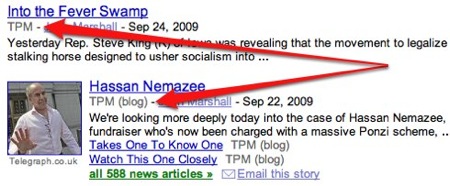![]() Last month, Google News made a small and mysterious change to the way it displays some news sources: “We’re now visibly marking articles published on a news blog with a ‘(blog)’ label attached to the publication’s name,” Google explained, attributing the switch to user feedback. The label, a spokesman later told me, applies to any content “published through blogging software.”
Last month, Google News made a small and mysterious change to the way it displays some news sources: “We’re now visibly marking articles published on a news blog with a ‘(blog)’ label attached to the publication’s name,” Google explained, attributing the switch to user feedback. The label, a spokesman later told me, applies to any content “published through blogging software.”
This was all sorts of weird. On both technical and philosophical levels, there’s no meaningful difference between blogs that publish news and news sites that aren’t published as blogs. Many news organizations place material on both types of platforms without considering the content any different. Some use blogging software like WordPress to produce sites that look nothing like blogs.
Dividing content along these lines is like classifying brownies based on whether they were baked in aluminum or glass pans. There’s no difference, and it obscures what you really want know: if they contain chocolate chips.
Weirder still is the slipshod manner by which Google News has deployed the labels. There are dozens, if not hundreds, of inaccurately labeled news sources, and it’s inconsistent even within companies like Gawker Media: Deadspin is a blog, but Gizmodo isn’t. Also not labeled a blog, despite identifying as such: West Seattle Blog and Talking Points Memo’s Editors Blog.
The latter was actually labeled a blog until September 24, when Google switched TPM back to non-blog status, as you can see below. Asked to explain, Chris Gaither, the spokesman for Google, said the company doesn’t comment on individual publishers. TPM declined to comment as well.

The “(blog)” label is small and may not affect the user experience, but I actually think it’s pretty significant. Splitting up content by subject matter makes sense, but why would Google want to classify news by platform? The only other label it applies to content in Google News is “(satire).” [UPDATE, 3:15 p.m.: Gaither helpfully points out that Google News also labels press releases, subscription content, and videos, among other content.]
The company describes this new label as “highlighting the diversity of content in Google News.” It’s hard not to wonder if Google sees this as a gesture to newspaper publishers who have occasionally complained that their content isn’t privileged over blogs. (Of course, the “(blog)” label is supposed to apply to newspaper blogs, too. But that’s also wildly inconsistent: Blogs like The New York Times’ Media Decoder are sometimes labeled correctly and sometimes not.) Google has been unusually public of late in positioning itself as a friend of the news industry, and that could be the context here.
If so, and even if not, we should be worried. Google’s neutrality when indexing and displaying news sources is critical to allowing new systems of news to flourish. Already, Google News has run into trouble by occasionally excluding neighborhood news sites and popular blogs like Boing Boing.
The new “(blog)” label may not be about creating a hierarchy of content, but if there are no corresponding labels for “(newspaper article)” or “(front-of-the-book squib in a biweekly magazine),” and if they can’t even identify blogs correctly, why is Google even going there?
I asked Gaither, the spokesman for Google News, about all my concerns, and he provided this statement:
We added the “(blog)” label after receiving feedback from some Google News users who told us they’d like to know whether a listed story is a blog item before they click on it to visit the publisher’s website. Our goal is to give users as much information as possible so they can choose what kind of news content they’d like to read.